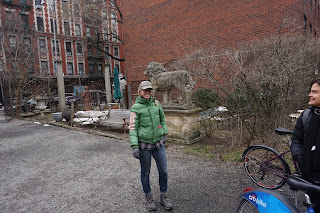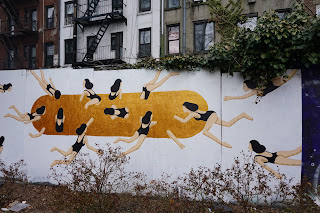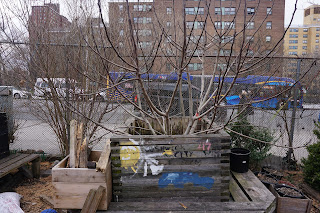
Rebekah, Corey, Jennifer and I rode bikes all day. We
meandered from Elizabeth Street Garden, (between Prince & Spring streets) in Soho to
Children’s Magical and Siempre Verde Gardens on the Lower East Side – all green
spaces in danger of development.
From Harlem to Coney Island and all over New York City, the city
is slowly privatizing the commons. Community spaces are being sold off to
the highest bidders, green spaces bulldozed to make way to condos that few can
afford. Space is a commodity here. Still,
people are fighting for their access to a bit of a commons. Our democratic life depends upon this.
Riding we talked about the struggle to save Elizabeth
Street Garden, where supporters have retained “Norman Siegel in their
our efforts to protect & preserve the Garden,” while the City “plans to destroy the garden.” Jennifer and
I talked about how different strategies the gardeners are using to preserve the
garden. Its a majestic space that brings the community together.
Back we rode to Liz Christy and El Jardin Paraiso,
the iconic gardens of the movement, taking in the murals along Houston Street,
the Cemetery on First Street.
Each space is ripe with memories of garden parties
past, stories, book club meetings, garden marches, each celebrations, and
street actions over the years. Building on the lessons of Liz Christy and the
Green Guerillas, we’ve thrown seed bombs and created new gardens, bolting open fences
as we did with Siempre Verde in 2012. Some
we kept, others have been take back by the city.
Finishing our tour of Lower East Side Gardens, we rode
across the Williamsburg Bridge, zigging and zagging. Corey ended up riding Jennifer over the bridge
and on our way from Williamsburg to Buy Stuy where we rode to Myrtle Village Green, a community garden
and green space on Mrytle between Franklin and Kent! Manny, a volunteer with the garden, was there
to meet us and show us around this space that feeds 22 families. The signs for the plants are in Spanish and
Bengali. Participatory budgeting meetings are held here. So too should plans for the garden’s future. Afterall,
spaces like this are incubators for democracy. Sadly, the garden’s future of
the space is in drought. The community
has offered an alternative sight for the garden. But no one is sure what is going to happen
with this space.
Looking at these
gardens, you see the innovations that take place in these spaces where children
come to learn about the environment, to plant, and compost.
Rebecca points out
oregano, sage and yarrow in the herb garden.
Manny shows us dirt
planted that the Steinway family donated to the space.
And Corey climbs the
trees.
Next, we rode to Bushwich City Farm, a majestic community hub
at 354 Stockton St, just off Myrtle. Walking inside, people are
lighting a fire to cook some food. Kids are playing football and community
members are sharing plans. And chickens are chatting. The fire reminds me of the warm fires we had outside of Esperanza Community Garden before it was bulldozed eighteen years ago.
“Its up to us,” notes one supporter, pointing out that this is
all about mutual aid. The garden is owned by a private developer, who has floated
plans to evict the gardeners for months.
But hopefully the storm has passed.
And supporters talk about ways to share the space to everyone
has access to the energy growing from it.
The garden website points out: “since 2011, the Stockton
Street location of Bushwick City Farm (BCF) has been a great benefit to the
local community by providing free organic food, youth education, a
demographic-spanning gathering place, and a green oasis in a densely urban
area. The farm is now facing sudden eviction by the land owner, who wants to
develop the land. Bushwick City Farm helps to improve local health and provide
a community gathering place as well as a safe place for neighborhood kids to
play. Bushwick City Farm is a sorely needed and deeply loved community
resource.”
Rebekah, a long-term volunteer with the garden, points out, “Sundays are regular work days
in the garden, so there is opportunity to meet the neighbors, hang out in the
gazebo built by a local middle school classroom, or help with springtime farm
chores.”
“Welcome to the garden,” she smiles cooking some food. She
points out that kids from all over play here.
And that unlike other urban farms, there are no individual plots.
Hopefully the gardeners can find a way to keep the space for the
community. The day of exploring gardens
in danger reminds us of just how precious and precarious democracy can be in the city. The commons are here for us.

























































































































































No comments:
Post a Comment